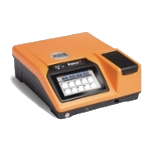- Analyzers
- Optics & Sources
- Technologies
- Support
- About
Total Sulfur in Hydrocarbons by ASTM D4294
Abstract

Petra MAX™ delivers advanced D4294 sulfur analysis in addition to 12 elements from P to Zn including Ni, V, and Fe. This robust benchtop analyzer complies with ASTM D4294 and ISO 8754 for measuring sulfur in hydrocarbons. Petra MAX is powered by HDXRF, utilizing XOS patented doubly curved crystal optics coupled with a high-performance silicon drift detector and an intense monochromatic excitation beam. This industry-leading technology reduces background noise and increases signal-to-noise output, enabling low detection limits and high precision without the need for consumable helium gas, a vacuum pump, or extensive sample preparation.
Background
Recent international trends across a majority of fuel types have focused on lowering specifications for total sulfur. These changes in regulation are in response to public health and environmental concerns. Examples include:
-
The International Maritime Organization’s announcement that MARPOL Annex VI, a regulation intended to control airborne emissions from ships, will reduce the total limit on sulfur content of fuel oil used on ships from 3.5 wt% to 0.5% by January 1, 2020.
-
In India, all automotive diesel and gasoline was transitioned to Bharat IV with a 50 ppm maximum sulfur in April 2017.
-
Jet fuel specifications such as ASTM D1655 and D6615 require a maximum sulfur of 3000 ppm.
To demonstrate compliance with these regulations, refinery and independent laboratories have long relied on standard methods such as ASTM D4294 and ISO 8754. These labs operate in fast-paced environments that require instruments that can provide rapid, precise results and are increasingly relying on solutions that provide simple, direct integration with laboratory information management systems (LIMS).
Connect with us
Application Study
In this study, various hydrocarbon matrix samples were analyzed to demonstrate the expected performance of Petra MAX utilizing ASTM D4294 methodology. Separate aliquots were prepared and analyzed for 5 minutes each. Their individual measurement results and average are reported in Tables 1 and 2. Samples were prepared by transferring 6 mL to a 43 mm XRF sample cup and sealed with an Etnom film.
| Table 1: S in Mineral Oil (ppm) | ||
|---|---|---|
| Expected (ppm) 20,000 | ||
| Analyzer 1 | User 1 | 20,559 |
| User 2 | 19,301 | |
| Analyzer 2 | User 3 | 20,522 |
| Analyzer 3 | User 4 | 20,126 |
| Analyzer 4 | User 5 | 19,664 |
| Average | 20,034 | |
| Standard Deviation | 547 | |
| RSD% | 2.7% | |
Accuracy Study
To study the accuracy of Petra MAX, ten measurements were performed on a commercially-available mineral oil reference material containing 20,000 ppm of S. Samples were run on four analyzers by five different users. Results can be found in Table 1, and demonstrate the accuracy achievable with Petra MAX.
Precision Study
To study the precision of Petra MAX, various hydrocarbon samples were analyzed. These samples include heating oil, kerosene, jet A, vacuum gas oil (VGO), and crude oil. The analyses were performed at separate laboratories with unique instruments and users. The results shown in Table 2 demonstrate that Petra MAX delivers precise measurements across a wide range of hydrocarbon sample types. In addition, Petra MAX is a valuable tool to monitor trends and identify materials that simply do not meet specification.
| Table 2: S in Hydrocarbons (ppm) | ||||||
|---|---|---|---|---|---|---|
| Sample Type | Crude Oil | VGO | Kerosene | Heating Oil | Jet A | |
| Analyzer 1 | User 1 | 16,553 | 6,754 | 146 | 391 | 930 |
| 16,509 | 6,851 | 148 | 405 | 906 | ||
| Analyzer 2 | User 2 | 16,353 | 7,003 | 148 | 410 | 976 |
| 16,751 | 7,017 | 152 | 428 | 974 | ||
| Analyzer 3 | User 3 | 17,666 | 7,002 | 161 | 436 | 987 |
| 17,415 | 7,202 | 157 | 430 | 1,023 | ||
| Analyzer 4 | User 4 | 17,219 | 7,284 | 157 | 435 | 1,028 |
| 17,382 | 7,308 | 138 | 434 | 1,017 | ||
| Average | 16,981 | 7,053 | 151 | 421 | 980 | |
| Standard Deviation | 497 | 199 | 7 | 17 | 44 | |
| RSD% | 2.9% | 2.8% | 4.9% | 4.0% | 4.5% | |
Conclusion
Sulfur analysis using ASTM D4294 and ISO 8754 continues to be an important measurement for refinery and independent laboratories around the world. Global regulation trends toward lower sulfur fuels demonstrate the need for a rapid and precise analysis solution. That solution is Petra MAX. Utilizing the most advanced optics technology, Petra MAX delivers accurate measurement across various hydrocarbons without the need for complex sample preparation or consumable gasses.

